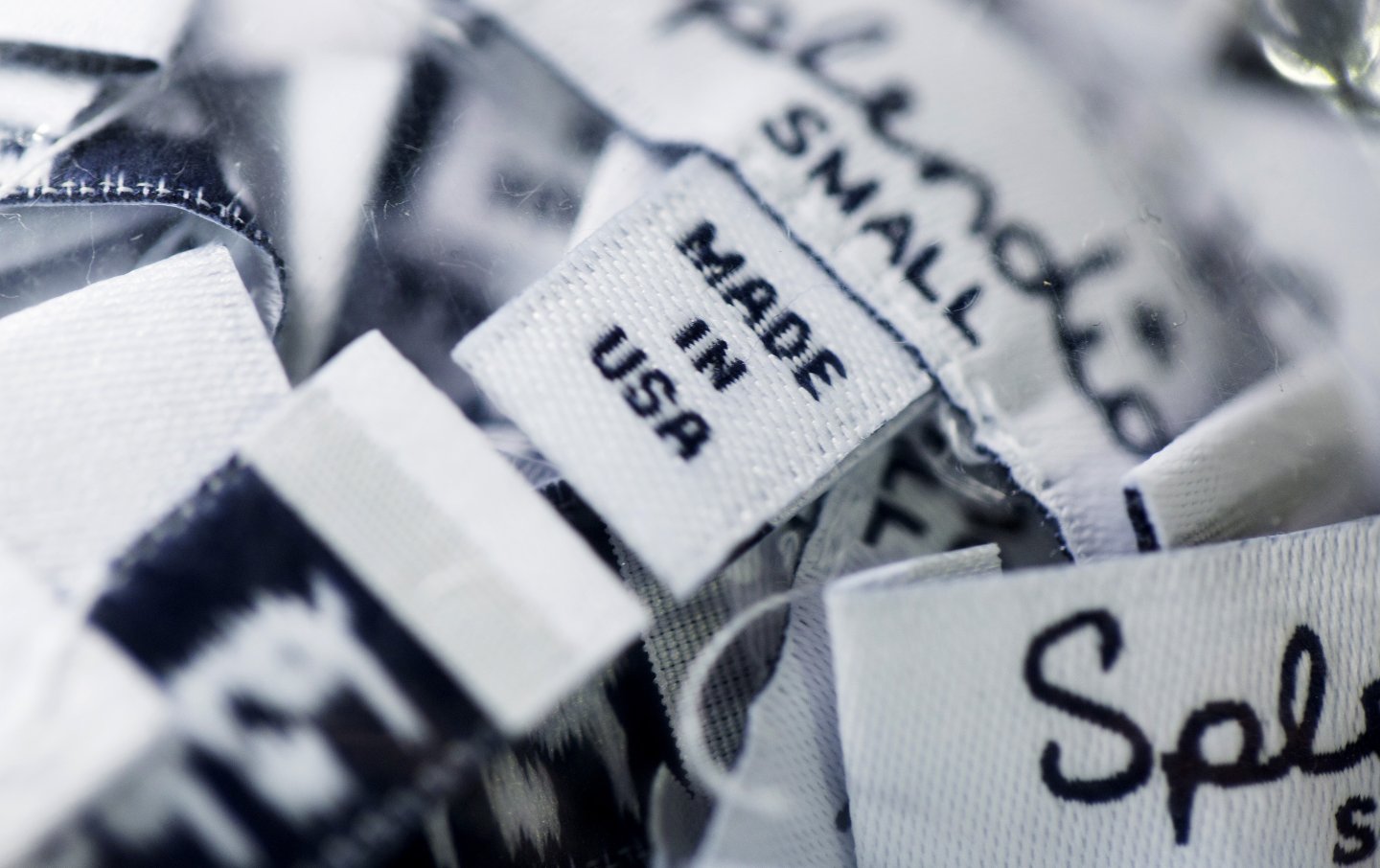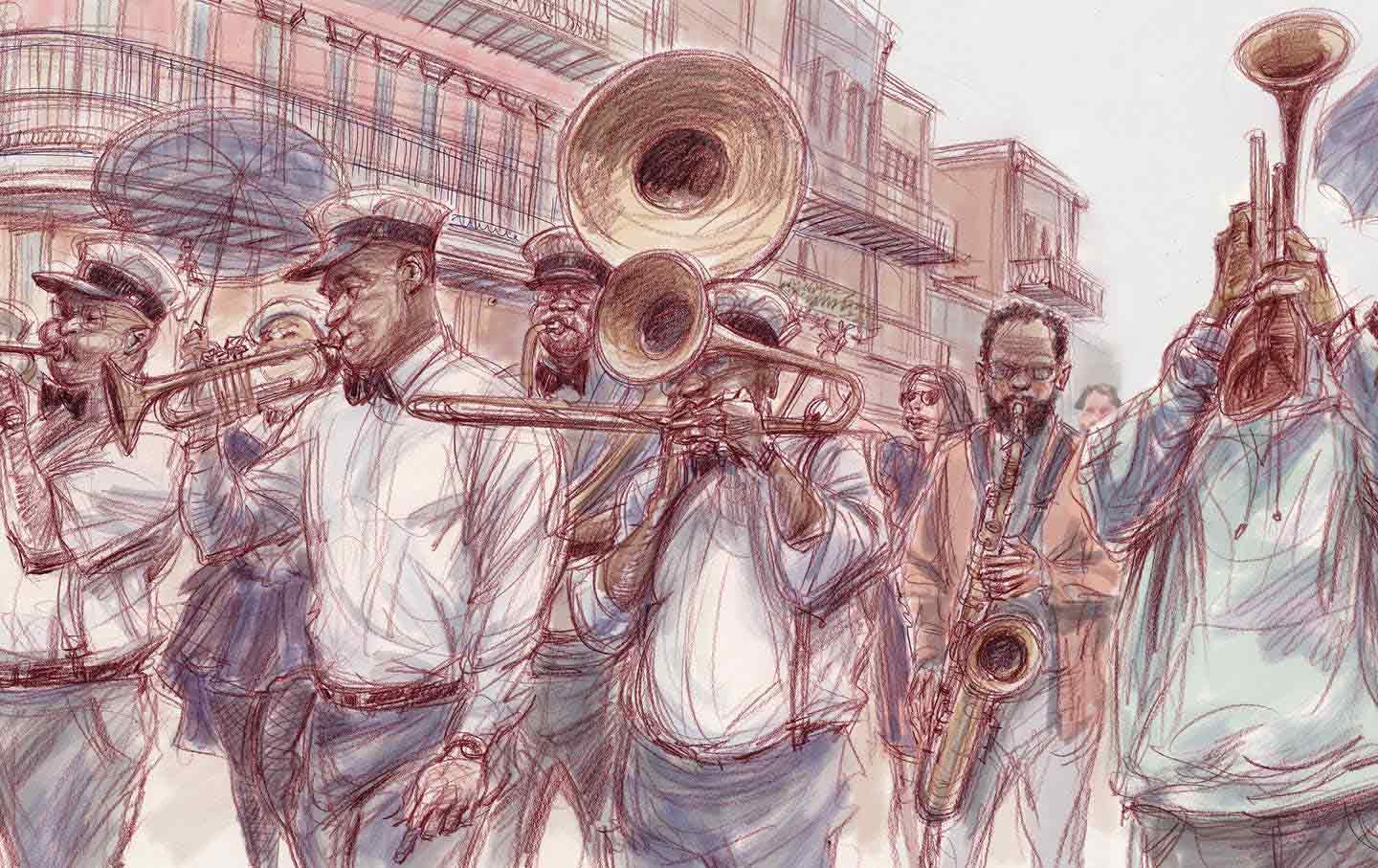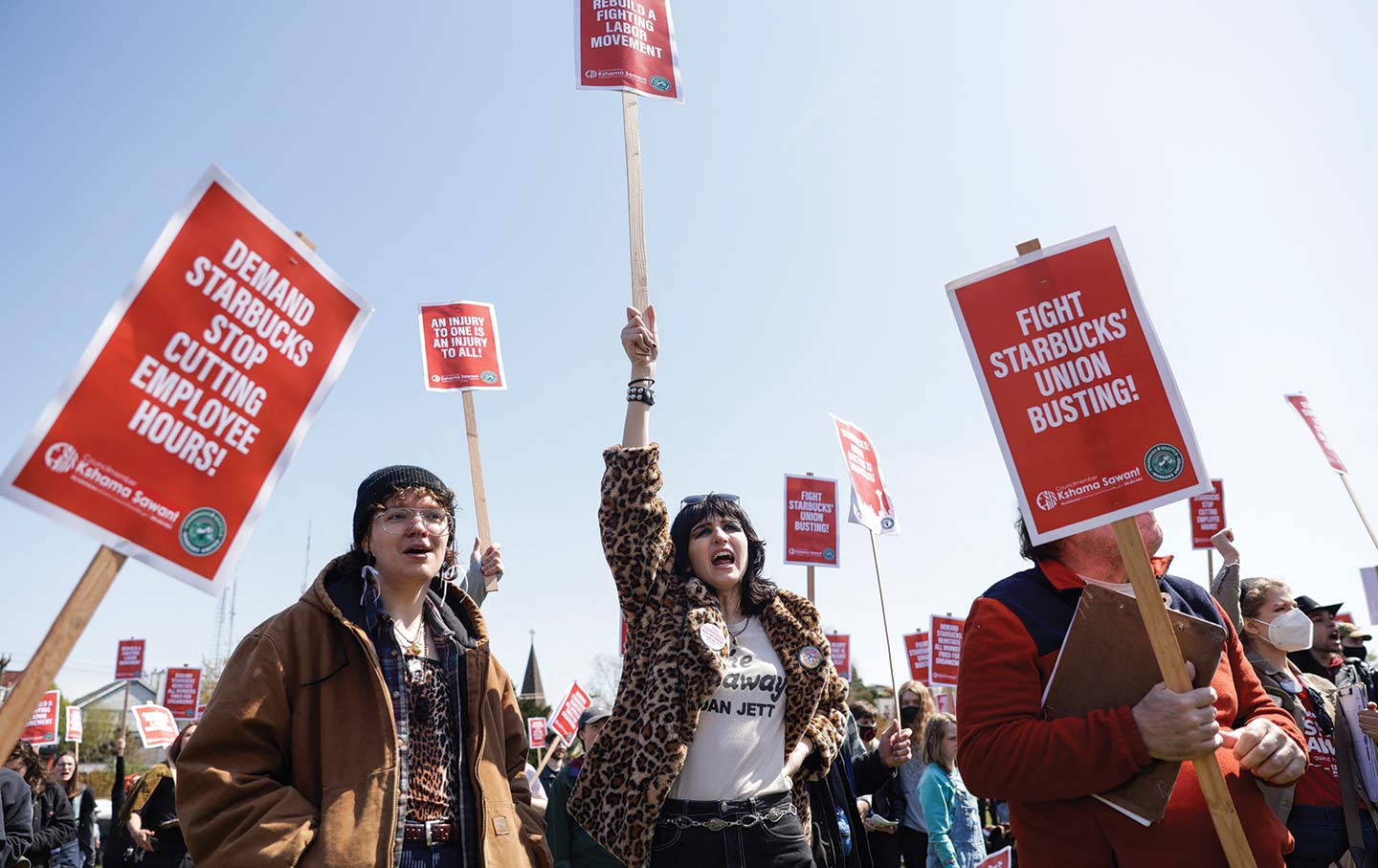“Made in America” Never Meant More Ethical
Garment workers in the US are paid far below minimum wage. New legislation, if implemented successfully, would change that.

“MADE IN USA” clothing labels sit in a pile at the 5 Thread facility in Los Angeles.
(Meg Roussos / Getty Images)Inside a pair of heavily distressed Fashion Nova jeans, there’s a small label bearing an American flag and neatly embroidered sans-serif lettering, which spells out the proud phrase “MADE IN USA.” For decades, the “Buy American” movement rested on the belief that such labels guaranteed a certain standard of quality and care. There lingered an assumption that US-made garments were produced in a more ethical manner than their foreign competitors, particularly those imported from lower-cost countries. The reality, however, is a bit more complicated.
Nestled in the vast expanse of Los Angeles County, there’s a 107-block industrial area known as the Fashion District, where some 1,400 manufacturers and contractors produce about 80 percent of all US-made garments. This is where Bilma—whose last name is withheld for her safety—works as a single-needle sewing operator. Her sewing journey began at the age of 22, under the guidance of her grandmother, herself a seasoned garment worker, in Oaxaca, Mexico. Having migrated to the United States about 11 years ago, Bilma has made a living skillfully operating industrial sewing machines for some of the country’s biggest fashion brands.
Every day at 6 am, Bilma boards a bus that shuttles her to downtown Los Angeles’s Fashion District. When she reaches the garment factory an hour later, she starts working immediately, without punching in. Like thousands of other garment workers in the United States, Bilma’s wages aren’t tethered to the clock but rather to the quantity of operations she executes. Three cents for a zipper or sleeve, five cents for a collar, and seven cents to prepare the top part of a skirt before she passes it onto the next sewing operator in line. Assembling an entire dress earns her a mere 15 cents. Bilma toils away on garments primarily for fast-fashion labels such as Fashion Nova, Lulus, and Lucy in the Sky, who prioritize quickly stocking on-trend items over the quality of materials. These companies peddle things like $80 maxi dresses, $25 poplin dress shirts, and $5 crop tops, all modeled by beautiful people and bedecked with the tantalizing promise of low-cost glamor.
This worker payment system, known as “piecework” in the garment industry, is how US-based manufacturers can sidestep labor laws that require companies to pay at least the minimum wage. Rather than compensating Bilma for the exhausting 12-hour shifts—a regimen that, according to LA County’s minimum wage requirement, should yield $202.80—her pay is determined by the individual tasks she performs, which can fluctuate daily. Despite her adept handling of hundreds of garments a day, Bilma’s earnings typically linger around $50 per day. That’s $300 weekly for the standard six-day grind and $350 if she opts for Sunday labor. Doing what she can with this modest income, Bilma spends $400 a month to live in a two-bedroom apartment with six other people, some of whom are day laborers. In this crowded arrangement, two occupants squeeze into each bedroom, while two more lay claim to the living room. Bilma sleeps in the corner of the bustling kitchen.
Her circumstances are, unfortunately, far from unique. A 2016 UCLA Labor Center inquiry laid bare the harsh reality of the US garment industry, revealing that the median piece-rate worker in Los Angeles typically scrapes together $5.15 per hour—less than half the state’s mandated minimum wage. A Federal Department of Labor investigation the same year found that 85 percent of Los Angeles garment factories were breaking wage laws, which, in 2016, resulted in $1.3 million in back wages owed to 865 workers in a sample of 77 factories. “We work 60 to 70 hours a week for a salary of $250 to $300,” Santa Puac, a former garment worker and mother of three, said at a 2021 labor rally. “It’s not enough to take care of our families.”
With no hourly compensation system in place for garment workers, there’s also no tangible record of a worker’s labor, such as pay stubs. Bilma’s daily routine extends from 7 am to 7 pm, yet she describes feeling like a ghost as she navigates her day, her labor nearly invisible. On top of it all, the conditions in the factories she works in are deplorable: She describes sewing threads tainted with rat urine, poorly vented rooms with dusty air, and unstable chairs on which she must perch throughout the day. Having toiled in 30 different US factories over the last 11 years, Bilma now suffers from chronic pain in her knees, hips, and hands. Healthcare is an unattainable luxury for her, as the meager funds remaining each month, after covering essential expenses such as food and rent, offer no room for medical assistance.
The piecework system is the soil on which American sweatshops thrive. In Los Angeles, these operations are triangulated by the destitution of Skid Row and the meticulously groomed landscapes of downtown business centers. In the early 1990s, Mike Davis documented the hostile architecture and policing instituted to shield white-collar professionals around the Ronald Reagan State Building from the uncomfortable sight of the unhoused and poor. He describes “armed guards, locked gates, and tiers of security cameras” around the Broadway Spring Center to “ensure the physical separation of the different classes.” While perhaps not explicitly policed, the way people experience fashion in Los Angeles is similar: Sweatshops are shrouded, concentrated within this light-manufacturing district, scarcely two miles away from the gleaming facades of Nordstrom and Sephora just north. There, shoppers can indulge in the spectacle of fashion without having to peer behind the curtain to see who works to create this fantasy.
In September of 2021, labor advocates rejoiced when California passed Senate Bill 62 (SB 62), also known as the Garment Worker Protection Act. This landmark legislation made California the first state to prohibit piecework, requiring that garment workers make no less than the minimum wage. It also held manufacturers and brands liable for stolen wages, which are calculated as the difference between what a worker should be paid under minimum wage laws and what they actually earn through piecework. After signing the bill, Governor Gavin Newsom hailed it as “nation-leading.” “These measures protect marginalized low-wage workers, many of whom are women of color and immigrants, ensuring they are paid what they are due and improving workplace conditions,” he promised.
However, more than two years since the bill’s triumphant passage, its implementation has proven feeble. California’s first-ever arrest for wage theft in the garment industry occurred just last month, when Lawrence Lee, a co-owner of a garment manufacturing business, and Soon Ae Park, a garment contractor with a history of stealing wages, were arraigned on felony charges. Their alleged misdeeds included compensating workers with as little as $6 per hour, many earning an average of $350 for a 50-hour workweek. As of the publication of this article, Bilma says she still toils under the piecework system, despite the passage of SB 62.
Addressing this entrenched injustice demands sustained efforts. In September of this year, Senator Kirsten Gillibrand of New York, joined by Representative Jerrold Nadler, reintroduced a pivotal piece of federal legislation—the Fashioning Accountability and Building Real Institutional Change (FABRIC) Act. Designed to safeguard an estimated 100,000 garment workers nationwide, the FABRIC Act proposes the federal elimination of the piecework system, ensuring that every garment worker receives at least the minimum wage. This would expand protection to all states, including Texas, where many factories still pay workers per operation. The FABRIC Act establishes national liability for wage theft, holding manufacturers, subcontractors, and brands accountable. To prevent businesses from evading consequences by simply rebranding, the legislation mandates that companies register with the Department of Labor. Importantly, if enacted, the FABRIC Act will institute a multimillion-dollar grant program to support the growth of ethical manufacturing jobs.
The FABRIC Act would mark a significant step toward protecting garment workers like Bilma by arming labor advocates with legal instruments to pursue those responsible for transgressions. The road to efficient enforcement, however, is not without obstacles. A significant hurdle lies in the vulnerability of many garment workers, especially those who are undocumented immigrants. Fearful of immigration sweeps or coerced into silence by their employers’ threats of deportation, these workers hesitate to report labor abuses. Addressing this issue may require a comprehensive approach that legally safeguards undocumented workers and empowers them so they can advocate for themselves. Safeguarding these workers would dismantle the exploitative practices that garment manufacturers often leverage, eliminating their ability to exploit this vulnerable labor pool.
Popular
“swipe left below to view more authors”Swipe →Daisy Gonzalez, a lead organizer at the Garment Worker Center—one of the primary organizations marshaling the FABRIC Act through Congress—underscores the difference ordinary people can make to help garment workers. By reaching out to state representatives, urging their endorsement of the bill, and amplifying awareness on social media platforms, individuals can play a crucial role in building on this bill’s momentum, she says. Adding their voices to the online petition can also further strengthen their collective push for change.
People nowadays have more access to information than ever before and can make better consumer choices, Bilma emphasized during our conversation. “When people see a label that says something was made in the US, they assume it was made in First World conditions, not Third World conditions…but the reality is that many of these brands are robbing us,” she says. “If I heard a brand was using a factory that was abusing its workers, I would not buy their products.… This is our fight now to hold brands accountable. We want to move forward, not backward.”
Correction: A previous version of this article stated that former Representative Carolyn Maloney helped reintroduce the FABRIC act to Congress in September 2023. Representative Jerry Nadler helped to reintroduce the bill this year.
Disobey authoritarians, support The Nation
Over the past year you’ve read Nation writers like Elie Mystal, Kaveh Akbar, John Nichols, Joan Walsh, Bryce Covert, Dave Zirin, Jeet Heer, Michael T. Klare, Katha Pollitt, Amy Littlefield, Gregg Gonsalves, and Sasha Abramsky take on the Trump family’s corruption, set the record straight about Robert F. Kennedy Jr.’s catastrophic Make America Healthy Again movement, survey the fallout and human cost of the DOGE wrecking ball, anticipate the Supreme Court’s dangerous antidemocratic rulings, and amplify successful tactics of resistance on the streets and in Congress.
We publish these stories because when members of our communities are being abducted, household debt is climbing, and AI data centers are causing water and electricity shortages, we have a duty as journalists to do all we can to inform the public.
In 2026, our aim is to do more than ever before—but we need your support to make that happen.
Through December 31, a generous donor will match all donations up to $75,000. That means that your contribution will be doubled, dollar for dollar. If we hit the full match, we’ll be starting 2026 with $150,000 to invest in the stories that impact real people’s lives—the kinds of stories that billionaire-owned, corporate-backed outlets aren’t covering.
With your support, our team will publish major stories that the president and his allies won’t want you to read. We’ll cover the emerging military-tech industrial complex and matters of war, peace, and surveillance, as well as the affordability crisis, hunger, housing, healthcare, the environment, attacks on reproductive rights, and much more. At the same time, we’ll imagine alternatives to Trumpian rule and uplift efforts to create a better world, here and now.
While your gift has twice the impact, I’m asking you to support The Nation with a donation today. You’ll empower the journalists, editors, and fact-checkers best equipped to hold this authoritarian administration to account.
I hope you won’t miss this moment—donate to The Nation today.
Onward,
Katrina vanden Heuvel
Editor and publisher, The Nation
More from The Nation

The King of Deportations The King of Deportations
ICE’s illegal tactics and extreme force put immigrants in danger.

The Epstein Survivors Are Demanding Accountability Now The Epstein Survivors Are Demanding Accountability Now
The passage of the Epstein Files Transparency Act is a big step—but its champions are keeping the pressure on.

Mayor of LA to America: “Beware!” Mayor of LA to America: “Beware!”
Trump has made Los Angeles a testing ground for military intervention on our streets. Mayor Karen Bass says her city has become an example for how to fight back.

Breaking the LAPD’s Choke Hold Breaking the LAPD’s Choke Hold
How the late-20th-century battles over race and policing in Los Angeles foreshadowed the Trump era.

The Fight to Keep New Orleans From Becoming “Everywhere Else” The Fight to Keep New Orleans From Becoming “Everywhere Else”
Twenty years after Katrina, the cultural workers who kept New Orleans alive are demanding not to be pushed aside.

Organized Labor at a Crossroads Organized Labor at a Crossroads
How can unions adapt to a new landscape of work?


